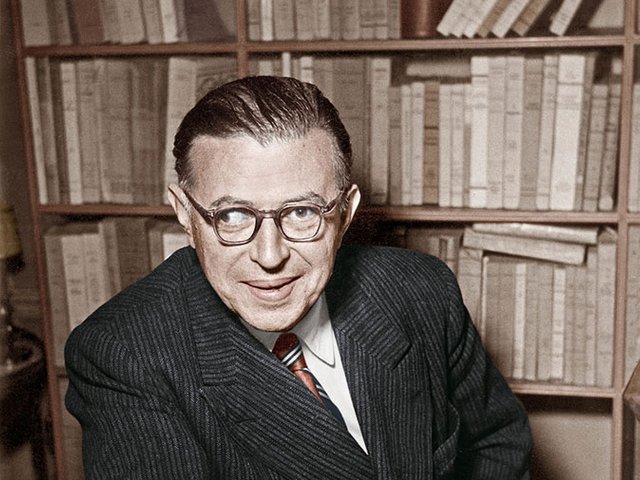Jean-Paul Sartrе who said hell were the others

Sartrе is the most representative figure for existentialist philosophy, which explains in his specialized texts and illustrates in artistic works - novels, stories and dramas. He is also one of the leading representatives of the French philosophy of the 20th century as well as Marxism. Sartre's work also has an impact on sociology, critical hypostolonic theory, and literary criticism. Sartrе's glory is greatest in the decade after World War II, but it gradually worsens with the evolution of its political views all the way to the left. Practically for the rest of his life, he remains a figure of international significance, including in Bertrand Russell's tribunal, rescue of refugees and other causes. He is also known for his open relationship with the famous feminist Simón Bolívar
For his overall work in 1964, the Nobel Committee awarded Sartre Nobel Prize for Literature, which he refused to accept, relying on his principle of not accepting official awards, as in his words "a writer should not allow himself to become in an institution ". In 1939, Sartre was mobilized in the French Army where he served as a meteorologist. At the beginning of the war he was captured in June 1940 and held nine months as a prisoner of war. For Christmas he composed his first play. Because of his fragile health, Sartre was released in April 1941. He again started working as a teacher once he was given the status of a civilian. He was appointed to the Lycée Pasteur near Paris. Sartre is housed at the Mistral Hotel near Montparnasse and takes the place of a Jewish teacher who was forbidden to teach. After returning to Paris on May 21, 1941, Sartre participated in the formation of the Resistance Group Socialisme et Liberté along with Simon de Bovario, Merlo-Ponti and others. In August, he and Beauvoir went to the French Riviera, seeking the support of Andre Gide and Andre Malro. Zid and Malro hesitated, and perhaps that was the reason for Sarther's disappointment and discouragement. Socialism and freedom was dissolved due to the suspicion that it had been disclosed .
Sarther began writing before the war and published La Nausée in 1938, and a few months later he released his collection of stories "The Wall". During the positional war, over a year and a half, in the condition of forced inertia, he wrote several thousand pages - they include sketches, exercises and drafts for his later work. While in captivity, he read German philosophy, and after returning to Paris he quickly wrote "Being and Nothingness", which was released in 1943. During the occupation, two of the plays he wrote , "Flies" and "In a closed door". After August 1944 and liberation of Paris he was an active collaborator in Combat, a newspaper created by Albert Camus, a philosopher and author sharing similar beliefs with his. Sartrе remain friends with Camus, until he gives up communism. His ideas, Sartre, spread through the political, literary and philosophical edition Les Temps modernes (Modern Times), which he founded in 1945. Simone de Beauvoir, Merlo-Ponti and Raymond Aron also contributed to the magazine. Les Temps modernes sets the principles for the responsibility of intellectuals in their time, as well as the commitment of modern literature.
The philosophy of existentialism and, above all, Sartre himself gained immense popularity after the liberation of France from the German occupation. In 1945, Sartre delivered the lecture "Existentialism is humanism," in which a crowd of thousands of people is running. Since 1945, Sartre has been living near the corner of Saint-Germain Boulevard and spends his time in the neighborhood, an attractive center for all who are trying to find new ways of life. These are youngsters, students or not, many American scholars, visiting and local musicians, and the entire creative contingent of the traditionally neighboring neighborhood of Montparnasse. With its 24-hour activity, Saint Germain de Pre for several years has become a mythical place and later remains a tourist attraction. The place where the boulevard crosses the street where Sartre lived, in 2000, the Paris city councilors call it "Jean-Paul Sartre and Simon de Bovario Square". Sartre remains known as a philosopher-existentialist, though his views have been experiencing some evolution over time: to the phenomenological method he uses in Being and nowhere, he tries, not always successfully, to add elements of Marxism and psychoanalysis to account for the historical locality of man.
You got a 12.20% upvote from @postpromoter courtesy of @daydreaming!
Want to promote your posts too? Check out the Steem Bot Tracker website for more info. If you would like to support the development of @postpromoter and the bot tracker please vote for @yabapmatt for witness!
I'am the person who says hell is existentialism. :)